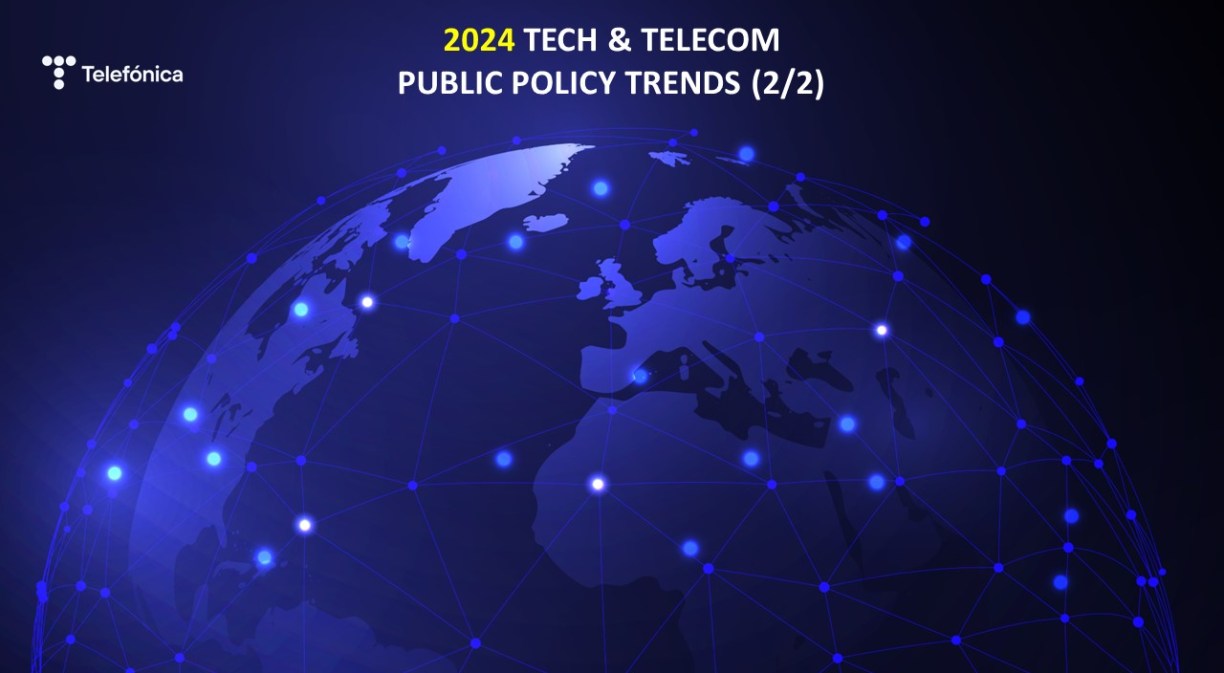Our first post covered the first five top technology and telecom policy trending topics in 2024, in a context where public policy is taking on a new dimension.
We addressed Artificial Intelligence; the new European institutional cycle: single market, the challenge of competitiveness and strategic autonomy; financing gigabit and 5G connectivity; a responsible spectrum policy to reach regional goals; consolidation, and the relevance of in-market first in the telecom sector.
Dive into the second set of 5 trends that will shape the tech and telecoms policy landscape in 2024!
Innovation and future-proof connectivity networks
Technology cycles are getting shorter and promoting innovation to make regions more competitive is one of the main policy priorities, including greater flexibility for cross-sectoral cooperation in areas such as smart factories.
2024 will be marked by the gradual phasing out of copper networks as we enter a new era of the next-generations networks. Based on fibre and 5G technologies, next generation networks offer lower latency, higher speeds, the ability to deliver higher quality services and reduced environmental impact. This will allow to accelerate the development of the digital services of the future, such as enhanced IoT solutions or the metaverse. Additionally, just in the early stages of 5G, a giant leap forward, 6G, is already on the horizon.
During the 2023 FTTH Conference 2023, stakeholders agreed the need to transform networks to keep pace with the a new era of digital innovation, triggered by technologies such AI, 5G, or IoT. Telecoms operators will continue innovating their networks, to anticipate and meet evolving digital demands. If MWC23 kicked off announcing the sector vision, Open Gateway, in 2024 the industry will continue to advance this project to turn networks into open innovation platforms for the digital services of the future.
The relevance of digital infrastructure and technologies in the fight against climate change
Digital technologies can be a key ally in tackling climate change
The twin transition, digital and green, becomes a global industrial strategy and 2024 will continue to emphasize the importance of a digitally enabled green transition. Concrete strategies such as the European Green Deal in Europe will serve as a reference for other regions.
Given the consensus on the benefit of digitization for sustainable development, debates will focus on the importance of including connectivity and digital technologies in the European taxonomy, while promoting regulatory, fiscal and financial frameworks to accelerate the digital and green transition. In addition, Telecom operators will continue to generate environmental benefits by promoting energy efficiency, a circular economy and sustainability along the value chain and efforts to develop green energy sources (including nuclear) will be consolidated.
Finally, progress will be made in raising awareness of the vital role that telecoms operators play in saving lives and mitigating disasters and climate change damage, with initiatives such as early warning systems set to be rolled out in the coming years.
Cybersecurity and trust building
Cybersecurity is one of the public policies priorities as the risk of cyberattacks and data breaches grow. Many factors will influence the cybersecurity landscape, resulting in a greater involvement of top management in cybersecurity: cyber threats will continue to grow and become increasingly sophisticated, including through the use of new technologies such as AI; improving the protection of critical infrastructure and essential services and enhancing the protection of the supply chain will become key policy objectives; cybersecurity regulation will continue to play an intense role, with several regulations underway in Europe and Latin America; cyber insurance which is becoming the fastest-growing sector of the global insurance market will influence the future cybersecurity landscape, and cyber rating agencies could proliferate in an unregulated space. Finally, there will be an increased focus on capacity building, to unlock funding, close the cybersecurity skills gap and strengthen the cybersecurity culture.
Building trust, protecting digital rights and data privacy, and enabling international data flows is becoming increasingly fundamental in our society. Data protection regulatory frameworks will be revisited, like the European GDPR, ePrivacy and data retention rules or cloud certification schemes. The EU’s Digital Markets Act (DMA) and the Digital Services Act (DSA) came into force in 2023, regulating the digital sector for a fairer, more contestable and safer digital space. 2024 will be the year of enforcement and when consumer protection, online safety and the fight against misinformation will be at the forefront of people’s and policymakers’ minds.
Bridging the digital divide for an inclusive transformation
Nassim Nicholas Taleb argues that in an increasingly fragmented and polarised world, and with millions of people on social networks, two somewhat antagonistic long-term trends are at play: the desire for more freedom and the desire for more equality.
… there is an even more powerful phenomenon: the aspiration for equality
Improved connectivity (coverage and use) and the development and adoption of new technologies open new opportunities for the social and economic development of the population and regions. Multiple opportunities are opening up for the reduction of the digital gap in Latin America, a region that is worryingly consolidating its position as the second most unequal region in the world.
In this context, the telecommunications sector is a key ally. The collective aim should not only be to improve coverage to connect the unconnected (already at 95% coverage worldwide) and stimulate innovation, but also to encourage usage (40% of the population covered by these infrastructures is still not connected) and also technological adoption by businesses (in particular SMEs) and public administrations. At the same time, a trustworthy environment, and universal design for accessibility should be part of an overall digital inclusion strategy, which aims to reduce the digital gap.
Cooperation, key to address common global challenges in a more fragmented world
2024 kicks off integrating new countries into the BRIC+ bloc, the political and economic arm of emerging economies, as an alternative (globalization) to the G7. This is a landmark towards a new world order that stresses the relevance of multi-stakeholder cooperation.
In this context, B20 India 2023, the G20 business forum, focused the policy debate on ways to raise the bar for shared global prosperity, setting the path for G20/B20 Brazil in 2024.
Meanwhile, 2023 COP28 in Dubai, the UN Climate Change Conference, sought common global formulas to combat climate change. This included the ITUs Green Digital Action Plan which emphasises the relevance of recognising the digital networks and technologies as enablers of the greening of the economy and society at large. Cooperation to fight climate change was also the aim of the First Ministerial Summit on Environmental Sustainability, framed within the OECD Regional Programme for Latin America and the Caribbean, paving the way for the coming years. These debates will continue in 2024.
In addition, a call to action to close the digital divide led to the 2023 First Meeting for Digital Inclusion in Latin America, while the relevance of alliances to this end was highlighted at the MWC23. Regarding the Internet Governance, key to global coherence and fair practices on digital issues, will continue to trigger discussions, and new formulas to move forward, like the Global Digital Compact led by the United Nations and expected in September 2024.
If you have reached this point and would like to follow the debate:











